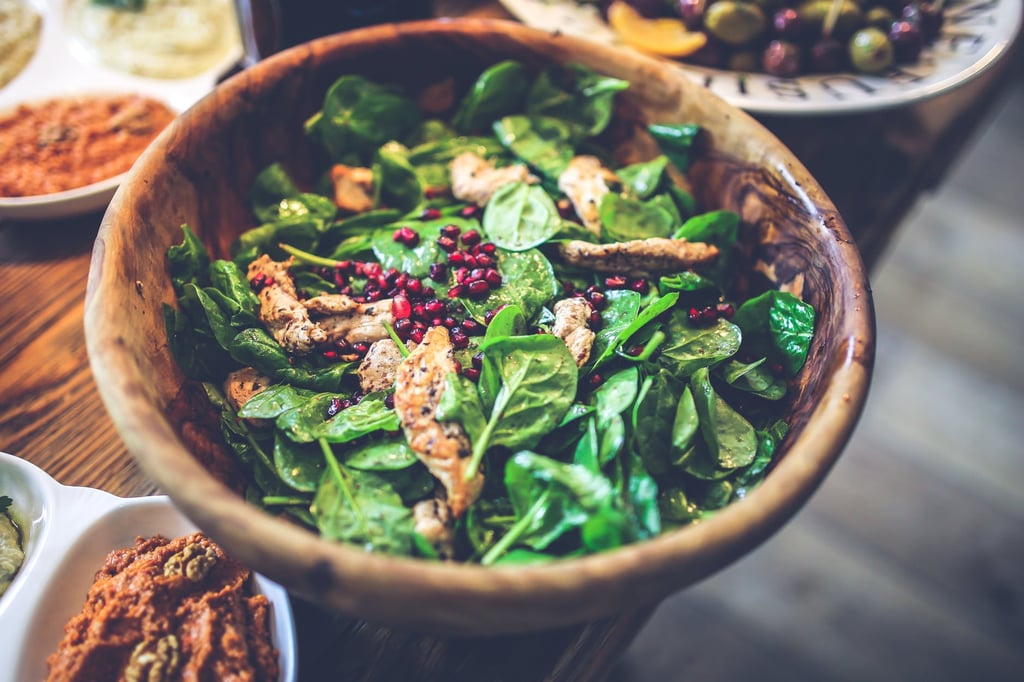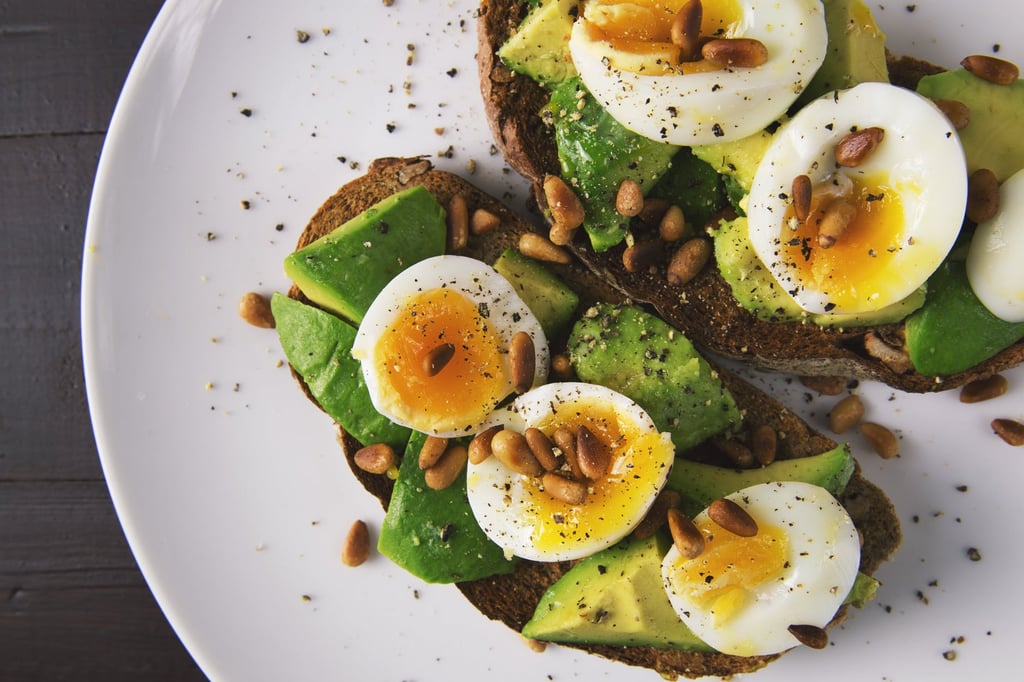If you're trying to conceive [1], are pregnant, or are in the postnatal lactation phase, you'll need to make sure your diet is well-rounded and filled with the right kinds of nutrients. Not only does that mean you should be meal-planning to guarantee you're eating a variety of vitamins and minerals [2] but also that you're fulfiling your daily requirements, which might be higher than normal. It's a good idea to discuss your current diet with your primary physician and come up with a great meal plan [3] together. They can better advise you on how much you need and to help with any obstacles you're facing. Here are the 10 best prenatal vitamins you'll need to eat each day.
Folic Acid

Make sure to eat your fair share of salads. "Folic acid is a B vitamin that is vitally necessary for pregnant women," Mark P. Trolice, M.D., reproductive endocrinology and infertility specialist at Fertility CARE - The IVF Center [4] and Associate Professor of Ob/Gyn at the UCF College of Medicine, tells POPSUGAR. "Before pregnancy and during pregnancy, a woman needs a minimum of 400 micrograms of folic acid daily to help prevent major birth defects of the fetal brain and spine called neural tube defects. Folic acid should be started several months prior to attempts at conception." Great sources include beans, peas, spinach, and legumes.
Iron

"In addition to folic acid during pregnancy, a woman needs more iron than a nonpregnant woman; actually, about double," says Trolice. "This helps a woman make more blood to carry oxygen to the baby." The daily amount needed (27 mg) can be achieved pretty easily. Foods high in iron [5] include lean red meat, poultry, fish, dried beans and peas, iron-fortified cereals, and prune juice, he says.
Calcium

More reasons to eat cheese! "Calcium is also needed during pregnancy to build the baby's bones and teeth. All women, including pregnant women, aged 19 years and older should receive 1,000 mg of calcium daily," says Trolice. Food sources include milk and other dairy products, such as cheese and yogurt. For women who can't tolerate dairy or don't like the taste, other sources [6] are broccoli, dark and leafy greens, and sardines, or you can always take a calcium supplement.
Vitamin D

"Vitamin D works with calcium to help baby's bones and teeth develop. It's also essential for healthy skin and eyesight [7]," says Trolice. All women, including those who are pregnant, need 600 international units of vitamin D a day, he says. Good sources include milk that's fortified with vitamin D and fatty fish, such as salmon. "Sunlight exposure also converts a chemical in the skin to vitamin D," he says, so make sure to spend a little time in the sun — with sunscreen, of course.
Choline

As if you needed more of an excuse to wake up to a hearty scramble. "Choline is essential to promote health at all life stages, but is particularly critical for brain health both early in life as the brain is forming and later in life to prevent cognitive decline," says Elizabeth Ann Shaw, MS, RDN, CLT, CPT, and author of Fertility Foods Cookbook [8], to POPSUGAR. "Ninety percent of Americans do not meet daily choline needs [9], and only 5 to 10 percent of pregnant women are meeting the adequate intake levels (AI) [10] for choline." Yikes.
Choline is found in many foods but in small amounts. "The best sources of choline are in foods that tend to be unpopular, such as liver, lima beans, and egg yolks," she says. The recommended daily intake for choline is 550 mg per day, she says.
Omega 3 Fatty Acids

"Omega-3s are essential for prenatal care and should definitely be included in a prenatal vitamin. DHA is vital for infant brain and eye development," explains Shaw. "Since mothers are the sole source of DHA for developing babies, it's critical that pregnant and nursing mothers eat enough fatty fish or take an omega-3 supplement." You can also get them from walnuts, grass-fed beef, and cage-free eggs.
In fact, a recent study published in the European Journal of Obstetrics & Gynecology and Reproductive Biology [11] found omega-3 supplement consumption was associated with a 58 percent decrease in the likelihood of early preterm birth (babies born before 34 weeks) and a 17 percent decrease in preterm delivery (babies born before 37 weeks). "DHA is one of 11 nutrients the American Academy of Pediatrics recognizes as crucial for neurodevelopment in the first 1,000 days of life," continues Shaw. "For pregnant and lactating women, optimal intake is 700 mg per day of EPA and DHA, with at least 300 mg as DHA."
Zinc

"This nutrient is involved in the synthesis of DNA, crucial for your baby's growth and development," says Shaw. It also can improve immunity [12], so you can avoid getting sick. "The recommended intake for zinc increases substantially during pregnancy in relation to DNA synthesis to 11 mg per day," she explains. If you don't like oysters, you can also load up on nuts, seeds, beans, and legumes.
Vitamin C

"In addition to being a powerhouse in the immunity department to help fight off infections and keep your skin healthy and wounds healing, vitamin C also acts to help increase your absorption of iron, another nutrient as you recall that is especially important during pregnancy," says Shaw. "The RDA for vitamin C is 85 mg per day during pregnancy." There are many places to get this nutrient, as it's in most colorful fruits and vegetables, such as citrus, bell peppers, kiwi, strawberries, and broccoli.
Iodine

"This nutrient is a major factor in thyroid hormones [13] and also increases fairly substantially during pregnancy, to a daily recommend intake of 220 mg per day," says Shaw. "If one does not consume adequate iodine, your baby's physical and mental development can significantly be impacted," she warns. It's not always the most common nutrient to find. "If you're one to use speciality salts like smoked sea salt over iodized table salt, be sure you're eating seafood or dairy products on the regular, which are also great sources of iodine," she adds.
Magnesium

"Magnesium is an important nutrient that helps relax muscles and build strong bones and teeth in your baby to be! Not only can adequate magnesium help you rest a little easier at night, it can also help with the inevitable constipation that can result from pregnancy," says Shaw. It's a win-win for both mom and baby. The RDA is set at 360 mg per day, she says, so make sure you're eating plenty of nuts and seeds, avocado, leafy greens, and fortified grains.